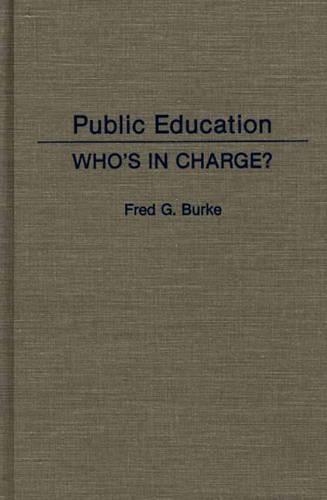
Public Education: Who's in Charge
(Hardback)
Publishing Details
Public Education: Who's in Charge
By (Author) Fred G. Burke
Bloomsbury Publishing PLC
Praeger Publishers Inc
20th March 1990
United States
Classifications
Tertiary Education
Non Fiction
Central / national / federal government policies
379.73
Physical Properties
Hardback
205
Description
This timely and important book by a former Commissioner of Education for both New Jersey and Rhode Island, presents a radically different point of view on the role of government in public education. Fred G. Burke effectively argues that education, especially that of the poor, cannot be viewed in isolation of the many factors that contribute to a productive life. With a forceful insight, he discusses many alternative policies and strategies that will alleviate the current crisis in public education. Concluding, contrary to most current studies, that the problems in public education cannot be addressed by the voluntary actions of thousands of near autonomous local school districts, Burke proposes a national policy which will redefine the role of the federal government in public education and address the entire range of child and youth needs. Policymakers and students of public policy and education, as well as the general reader concerned with public education, will find this book a source of stimulating and innovative ideas. The book begins with a chillingly realistic overview of the current status of the educational system in the United States. As the numbers of black and Hispanic students in public education reaches a majority, drop-out rates for both of these communities reaches 50 percent. Burke discusses the serious problems involved in this statistic in a section titled, A Generation at Risk. He follows this with a discussion of reform strategies and policies, covering the issues of the restructuring of schools, the national tests and national curriculum, and the status of the teaching profession. Finally, the book reviews the national public policy process and examines the elements of a national youth policy.
Reviews
." . . an important book at just the right time. The country hungers for fresh answers to our education mess, and along gallops this book with some new ammunition and answers."-Ken Auletta
"This is a hard-hitting confrontation of the most critical challenge facing the nation--education. . . . Written by an expert who has served in the trenches, the book destroys cliches and challenges us to act as a nation in dealing with the school crisis--before it is too late."-James MacGregor Burns Williams College
In the Congressional Record on June 9, 1977, Burke wrote "federal policy cannot be blind to the increasing failure of the traditional governance mechanisms in public education...." The concern expressed in 1977, that education policy should be placed at the national rather than state level, dominates this book. The author states that 'the existing parochial governance structure is incapable of coping with the national dimensions of the youth and education crisis.' The arguments as to the role of the federal and state governments in matters of education predate the Constitution and the Bill of Rights. The Tenth Amendment contained in the Bill of Rights, reserves matter such as education to the states. Although Burke readily admits that education is 'essentially and constitutionally a state responsibility, ' he puts forth formidable arguments as to why a national policy for education is needed to improve student learning in today's society. This discussion, as the Madison-Hamilton debates of yesteryears, will not go unchallenged. Burke's volume will stumulate agreement, argument, thought, and discussion, but it will raise more questions than it provides answers. Graduate level.-Choice
"In the Congressional Record on June 9, 1977, Burke wrote "federal policy cannot be blind to the increasing failure of the traditional governance mechanisms in public education...." The concern expressed in 1977, that education policy should be placed at the national rather than state level, dominates this book. The author states that 'the existing parochial governance structure is incapable of coping with the national dimensions of the youth and education crisis.' The arguments as to the role of the federal and state governments in matters of education predate the Constitution and the Bill of Rights. The Tenth Amendment contained in the Bill of Rights, reserves matter such as education to the states. Although Burke readily admits that education is 'essentially and constitutionally a state responsibility, ' he puts forth formidable arguments as to why a national policy for education is needed to improve student learning in today's society. This discussion, as the Madison-Hamilton debates of yesteryears, will not go unchallenged. Burke's volume will stumulate agreement, argument, thought, and discussion, but it will raise more questions than it provides answers. Graduate level."-Choice
Author Bio
FRED G. BURKE is a Professor of Political Science at the University of Connecticut. He is the author of numerous books. Dr. Burke is former Commissioner of Education for the State of New Jersey and former Commissioner of Education, State Board of Regents, Rhode Island.
